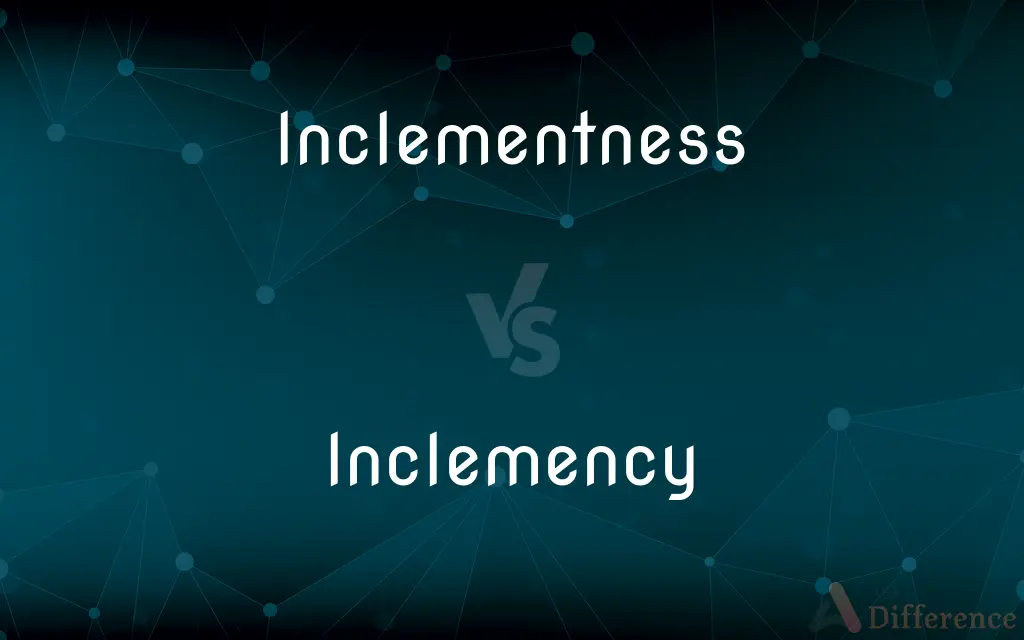Inclementness vs. Inclemency — What's the Difference?
By Tayyaba Rehman — Published on September 29, 2023
Inclementness and Inclemency both refer to harsh, severe weather conditions, with Inclemency also having a broader meaning encompassing lack of kindness or mercy.

Difference Between Inclementness and Inclemency
Table of Contents
ADVERTISEMENT
Key Differences
Inclementness and Inclemency primarily refer to the harshness of weather. The term Inclementness is derived from the adjective "inclement" which typically describes weather that is severe, harsh, or stormy. Its specificity centers on weather conditions. On the flip side, Inclemency, while often used to depict rough weather, can also encapsulate the general concept of severity, even beyond meteorological contexts.
Inclementness is a less commonly used term when compared to Inclemency. Both words emphasize unrelenting conditions, but Inclementness is almost exclusively tied to describing weather. Inclemency possesses a broader spectrum, often reaching into realms of describing harsh treatments or lack of mercy.
Grammatically speaking, Inclementness and Inclemency can serve as nouns in sentences. For instance, one might remark on the "inclementness of the winter storm." However, Inclemency might be employed in a sentence like, "The inclemency of his punishment surprised many."
In literature or colloquial usage, Inclemency is the more frequently chosen term. This might be because of its versatility. Where Inclementness purely speaks of weather, Inclemency can paint pictures of both harsh winters and a stern judge.
Comparison Chart
Primary Meaning
Severity of weather conditions
Harsh weather or lack of mercy
ADVERTISEMENT
Usage Frequency
Less common
More common
Contextual Versatility
Mainly weather-related
Weather and beyond (e.g., harsh treatment)
Grammatical Use
Used as a noun
Used as a noun
Derived From
Adjective "inclement"
N/A
Compare with Definitions
Inclementness
The state of having relentless and unfavorable weather.
Tourists are warned of the area's inclementness.
Inclemency
The state of being severe, harsh, or stormy, typically in reference to the weather.
The inclemency of the storm kept everyone indoors.
Inclementness
The characteristic of being harsh or rough meteorologically.
The region is known for its inclementness during winters.
Inclemency
Extreme cold, heat, or other uncomfortable meteorological conditions.
Travelers were unprepared for the desert's inclemency.
Inclementness
The trait of being unyielding or severe, mainly pertaining to weather.
Sailors spoke of the seas' inclementness.
Inclemency
The condition of being inhospitable or unforgiving, in climate or behavior.
Prisoners often talked about the inclemency of their cells.
Inclementness
The quality of being stormy or severe, especially in terms of weather.
The inclementness of the day made traveling difficult.
Inclemency
The characteristic of being unsparingly rigorous or tough.
He faced the inclemency of his critics.
Inclementness
The attribute of having consistently adverse climatic conditions.
The inclementness of the mountain tops deters many climbers.
Inclemency
Stormy
Inclement weather.
Inclementness
The state of being inclement
Inclemency
Showing no clemency; unmerciful.
Inclementness
Weather unsuitable for outdoor activities
Inclemency
The quality of being inclement; lack of clemency.
Inclemency
Something that is inclement.
Inclemency
The state or quality of being inclement; lack of clemency; lack of mildness of temper; unmercifulness; severity.
The inclemency of the late pope.
Inclemency
Physical severity or harshness (commonly in respect to the elements or weather); roughness; storminess; rigor; severe cold, wind, rain, or snow.
The inclemencies of morning air.
The rude inclemency of wintry skies.
Inclemency
Weather unsuitable for outdoor activities
Inclemency
Excessive sternness;
Severity of character
The harshness of his punishment was inhuman
The rigors of boot camp
Inclemency
Lack of mercy or leniency.
The judge was known for his inclemency towards lawbreakers.
Common Curiosities
Which term is more commonly used, Inclementness or Inclemency?
Inclemency is more commonly used than Inclementness.
Is Inclemency exclusively tied to weather?
No, while Inclemency can describe harsh weather, it can also denote a lack of kindness or mercy.
Can Inclemency describe a person's behavior?
Yes, Inclemency can describe a lack of mercy or a person's severe behavior.
Can both words be used in a meteorological context?
Yes, both can be used to describe severe weather conditions.
Can I use Inclementness to describe a judge's behavior?
No, Inclemency would be more appropriate for such a context.
Can Inclementness describe a lack of mercy?
No, Inclementness is mainly reserved for weather. Inclemency can describe a lack of mercy.
Are Inclementness and Inclemency synonymous?
They overlap in terms of harsh weather, but Inclemency has broader meanings.
Which term has a broader scope in usage?
Inclemency has a broader scope, encompassing harshness in weather and behavior.
How are the two terms different in literature?
In literature, Inclemency is often preferred due to its versatility.
What does Inclementness primarily describe?
Inclementness primarily describes the harshness or severity of weather.
How are Inclementness and Inclemency derived?
Inclementness is derived from the adjective "inclement", while Inclemency isn't derived in the same manner.
Do both terms have negative connotations?
Yes, both terms generally carry negative implications.
Which term is more versatile in a sentence?
Inclemency is more versatile, applicable to weather and behavioral contexts.
Are both terms nouns?
Yes, both Inclementness and Inclemency function as nouns.
In terms of harsh treatments, which word should I use?
For harsh treatments or lack of leniency, use Inclemency.
Share Your Discovery

Previous Comparison
Tax vs. Cess
Next Comparison
Leasing vs. FinancingAuthor Spotlight
Written by
Tayyaba RehmanTayyaba Rehman is a distinguished writer, currently serving as a primary contributor to askdifference.com. As a researcher in semantics and etymology, Tayyaba's passion for the complexity of languages and their distinctions has found a perfect home on the platform. Tayyaba delves into the intricacies of language, distinguishing between commonly confused words and phrases, thereby providing clarity for readers worldwide.













































